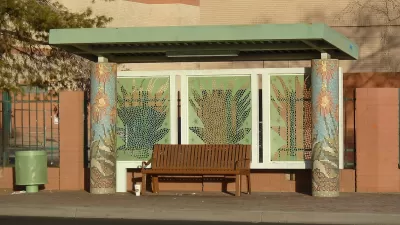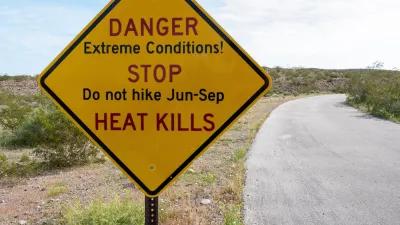As heat waves intensify, cities are seeking out heat mitigation techniques that can be applied widely and benefit entire neighborhoods.

With extreme heat becoming a severe health risk in more U.S. cities, local governments are looking for ways to mitigate its impacts at larger scales, reports Ysabelle Kempe in Smart Cities Dive. “Five cities — Atlanta, Boston, Dallas, New Orleans and Columbia, South Carolina — will participate in a three-year project to scale up the adoption of surfaces that reduce urban heat, the nonprofit Smart Surfaces Coalition announced Thursday.”
The project is aimed at reducing barriers to scaling up heat mitigation projects to make a difference at the neighborhood level. “The coalition’s analysis of citywide ‘smart surfaces’ adoption in Baltimore found that the strategy could cool the city by 5 degrees Fahrenheit and provide more than $10 in cost savings for every $1 spent.”
Kurt Shickman, director of extreme heat initiatives at the Adrienne Arsht-Rockefeller Foundation Resilience Center, explains the challenges, saying, “a city may not be able to plant trees where they would provide the most value if the land is private property or owned by, say, a water utility or public transportation authority. Shickman suggested that cities could develop incentives or even regulation to encourage cooling changes to the built environment.”
The Smart Surfaces Coalition says it can fund ten projects and welcomes applications from more cities.
FULL STORY: These 5 cities aim to cool down by scaling up ‘smart surfaces’ in coming years

Planetizen Federal Action Tracker
A weekly monitor of how Trump’s orders and actions are impacting planners and planning in America.

Maui's Vacation Rental Debate Turns Ugly
Verbal attacks, misinformation campaigns and fistfights plague a high-stakes debate to convert thousands of vacation rentals into long-term housing.

Restaurant Patios Were a Pandemic Win — Why Were They so Hard to Keep?
Social distancing requirements and changes in travel patterns prompted cities to pilot new uses for street and sidewalk space. Then it got complicated.

Charlottesville Temporarily Has No Zoning Code
A judge ordered the Virginia city to throw out its newly revised zoning code, leaving permitting for new development in legal limbo.

In California Battle of Housing vs. Environment, Housing Just Won
A new state law significantly limits the power of CEQA, an environmental review law that served as a powerful tool for blocking new development.

Boulder Eliminates Parking Minimums Citywide
Officials estimate the cost of building a single underground parking space at up to $100,000.
Urban Design for Planners 1: Software Tools
This six-course series explores essential urban design concepts using open source software and equips planners with the tools they need to participate fully in the urban design process.
Planning for Universal Design
Learn the tools for implementing Universal Design in planning regulations.
Heyer Gruel & Associates PA
JM Goldson LLC
Custer County Colorado
City of Camden Redevelopment Agency
City of Astoria
Transportation Research & Education Center (TREC) at Portland State University
Jefferson Parish Government
Camden Redevelopment Agency
City of Claremont





























